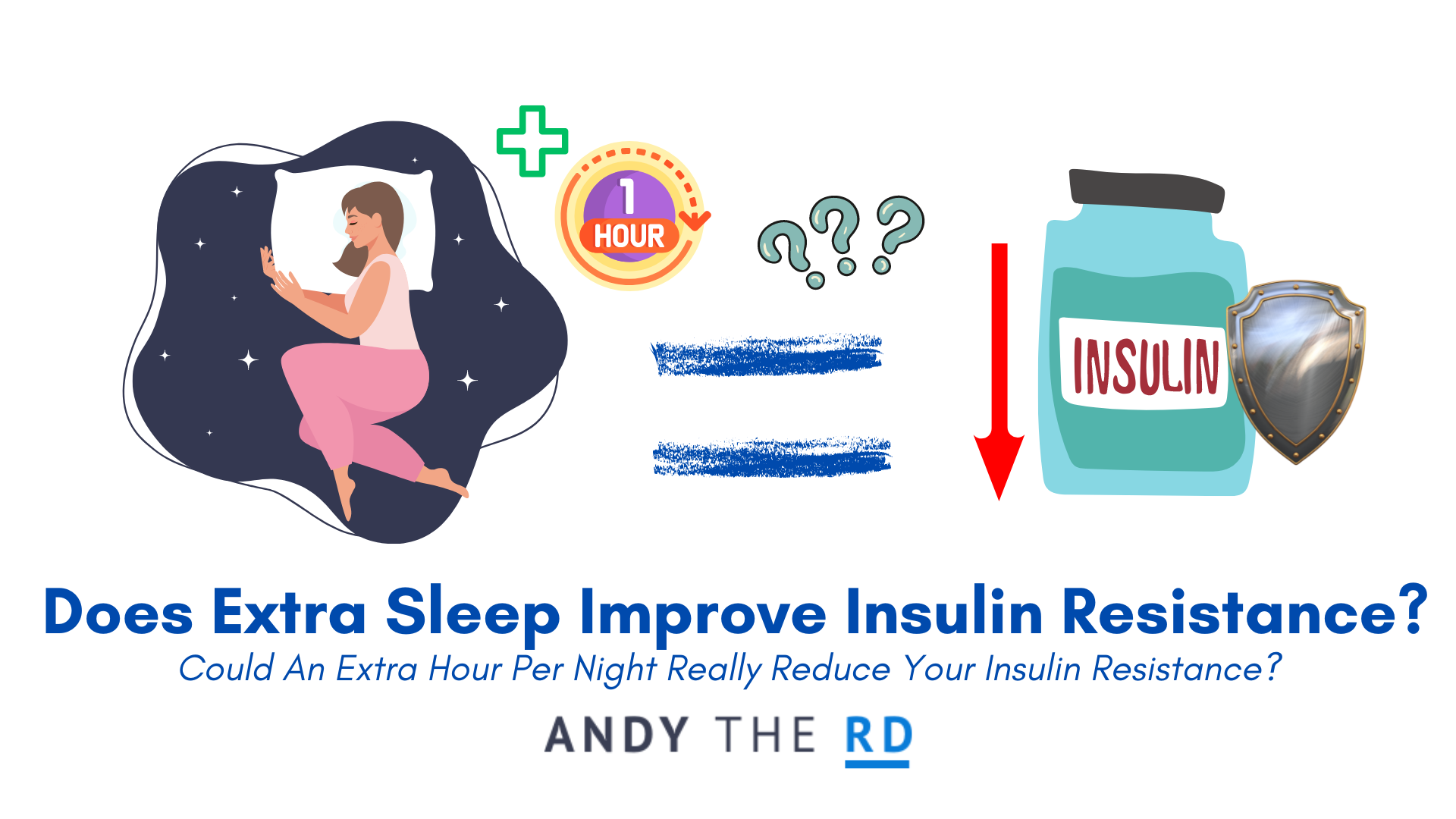Insulin is a hormone synthesized by the pancreas that plays a vital role in controlling blood sugar levels.
Insulin resistance occurs when the muscle, fat, and liver cells of your body lose their previous capacity to absorb glucose from the bloodstream for energy.
Consequences of insulin resistance can include:
- Pre & Type 2 Diabetes
- Fatty Liver Disease
- PCOS
Millions of people around the world seek out solutions and support to help prevent and manage these conditions.
But could sleeping a little bit more each night be one of them?
In today’s volunteer-driven content, my new contributor Abby Webber takes us on an exploration around the fascinating connection between sleep duration and insulin resistance.
Take it away Abby!
Extra Sleep And Insulin Resistance – Does It Help?
By Abby Webber and reviewed by yours truly
Short sleep duration is determined by the age-specific recommended daily sleep hours and is characterized as less than 7 hours per night for adults.
The goal of today’s blog post is to explore whether sleeping more can meaningfully influence insulin resistance.
Let’s get to the good stuff.
Short Sleep Duration & Insulin Resistance
The Cureus journal recently published a systematic review looking at the association between sleep duration and insulin resistance and determined that a low sleep duration was associated with increased insulin resistance.
This can arise for several reasons.
Reason #1 – Influence On Beta Cells
A recently published study out of the Journal of Endocrinology found that short sleep duration lowered the response of insulin producing beta cells in the pancreas to glucose, resulting in reduced insulin sensitivity.
Reason #2 – Increase In Blood Fats
Sleep deprivation can also lead to elevated levels of unwanted fatty acids in the blood stream (ie: triglycerides) which can contribute to insulin resistance by stimulating the liver to create more glucose than it otherwise would.
Reason #3 – Altered Insulin:Glucose Ratio
Another study found that restricting sleep to 4 hours for 5 consecutive nights resulted in heightened insulin levels, leading to an increased insulin-to-glucose ratio, which serves as an indicator of insulin resistance.
In sum, evidence clearly indicates a direct link between short sleep duration and insulin resistance, but it is also possible that insufficient sleep can worsen insulin resistance indirectly by influencing food choices.
Let’s explore that next.
Short Sleep Duration & Food Choices
Behaviour around food choices including cravings may be influenced by a lack of sleep and fatigue.
The Journal of Clinical Nutrition ESPEN found that short sleep duration results in an increase in energy consumption.
This occurs in part because there are more hours to eat, so eating frequency and total consumption has the propensity to increase.
Short sleep has also been shown to increase portion sizes due to increased appetite and hunger.
The tendency to overindulge after lack of sleep can also be attributed to a drive to counterbalance nighttime energy depletion and an elevated susceptibility of the brain’s reward pathways to energy-rich foods.
Individuals experiencing short sleep may be more likely to opt for less nutrient dense foods as compared to those who are well rested, all else equal.
When examining the brain using fMRI techniques, it is evident that sleep-restricted individuals exhibit heightened brain activity in response to less nutrient dense food choices as well as those with higher energy content.
Some studies have shown upsurges in hunger ratings from 14–30%.
One study observed an average uptick of 6% in total caloric intake, while the consumption of calories surged by 42% after dinner.
Given the significant role that food choices over time have to play in influencing insulin resistance, we can clearly see here how poor sleep habits could negatively effect it via this route.
Will More Sleep Improve Insulin Resistance?
The indications are all there, but do we have firm scientific evidence to demonstrable claim that sleeping more will reduce insulin resistance?
It looks like the answer is yes!
The Journal of Clinical Sleep Medicine found that sleeping more than 6 hours a night improved fasting insulin resistance and beta cell function.
So if you are currently sleeping less than 6 hours per night, pushing beyond that threshold may offer a meaningful improvement to your health.
Extending sleep duration by as little as 45 minutes per night is attainable and linked to greater insulin sensitivity in healthy adults who are experiencing chronic short sleep duration.
But wait, there’s more.
In 2023 the Diabetes Care journal found that markers of insulin resistance significantly increased when women who usually sleep 7-9 hours reduced their sleep duration by ~1.5 hours a night ( to around ~6 hours) over a 6 week period – the effect was more pronounced in post-menopausal women.
Microbiome & Inflammation
Andy here, just adding a little bonus content to Abby’s otherwise amazing piece of writing.
Let’s also consider the fact that a short sleep duration is linked to lower microbiome diversity AND higher inflammatory markers.
Inflammation worsens insulin resistance by interfering with cell’s ability to interact with insulin whereas low gut microbiome diversity is known to negatively influence how the human body metabolizes glucose (thus contributing to worse insulin resistance).
Taken together, it is not unreasonable to look at sleeping an extra 45-60 minutes a night ( especially if it pushes you above the 6 or 7 hour sleep threshold) as a kind of “supplement” that could theoretically boost your microbiome while reducing both inflammation and insulin resistance.
Not too bad eh!
Until next time
Abby Webber [Post-Graduate Nutrition Student] with Andy De Santis RD MPH



